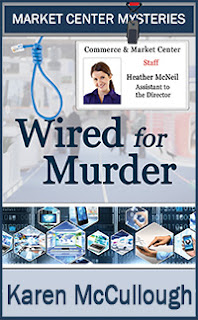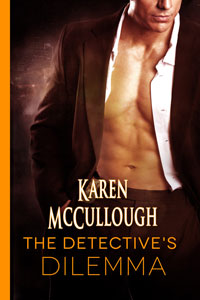Today it's my pleasure to present an interview of romance author Karen McCullough.
Latest Book:
The Detective’s Dilemma
Buy Link:
Amazon
BIO:
Karen McCullough’s wide-ranging imagination makes her incapable of sticking to one genre for her storytelling. As a result, she’s the author of more than a dozen published novels and novellas, which span the mystery, fantasy, paranormal, and romantic suspense genres. A former computer programmer who made a career change into being an editor with an international trade publishing company for many years, she now runs her own web design business to support her writing habit. Awards she’s won include an Eppie Award for fantasy; three other Eppie finals; Prism, Dream Realm, Rising Star, Lories, Scarlett Letter, and Vixen Awards, and an Honorable Mention in the Writers of the Future contest. Her short fiction has appeared in several anthologies and numerous small press publications in the fantasy, science fiction, and romance genres. She lives in Greensboro, NC, with her husband of many years.
Q: What’s your writing schedule like? Do you strive for a certain amount of words each day?
A: I’d like to be able to write on a schedule, but given the demands of the day job and family, that mostly doesn’t happen. I’m also the kind of writer who needs a block of time to sink into the story, so most of my writing is done either late at night or on weekends.
Q: What is the most important thing you do for your career now, as compared to when you first started writing?
A: These days it’s all about the promo, and to be honest, it’s not my favorite part of the job. When I published my first novel in 1990, the publisher handled most of the marketing. Not that there was much. They put your book in their catalogs, sent the book out to a few magazines that did reviews and maybe bought an ad or two. That was it. Now, I spend as much time doing promo stuff as I do writing.
Q: How much of yourself is hidden in the characters in the book?
A: I’d like to say quite a bit, especially the female characters, but I think that may be more wishful thinking than reality. I’ve heard a fellow mystery author describe her detective heroine as a “younger, braver and thinner version of myself.” I think that’s true of my heroines as well. On the other hand a writer can only use the materials she has, and it’s true that the person we each know best is ourselves, so some of that is bound to come out in each character we write.
Q: Do you eat comfort food/listen to music when writing?
A: I don’t eat at my desk, but I drink coffee – quite a lot of coffee, actually. I don’t listen to music while writing. I love music, but I find it too distracting to have it playing while I’m writing. I can’t ignore it if it’s there.
Q: How do you choose names for your characters?
A: This is going to sound odd, but I don’t choose names for my characters. They tell me their names.
Q: Covers. Ever get one you wish you could change?
A: Heavens, yes! My first four books were published by Avalon Books in hardcover, and I never liked any of the covers I got from them very much. One of them – Stormtide – is absolutely awful. You can see those early covers on my website here:
http://www.kmccullough.com/backlist.php. It’s probably not politically correct to admit this, but I’m not really thrilled with cover of The Detective’s Dilemma. My cop hero would never, ever, go around with his shirt hanging of like that. But I have to assume that the Kensington/Lyrical marketing dept. knows what they’re doing.
Q: Give one advice tip to an aspiring author.
A: Grow a thick skin. You’re going to need it. There’s a lot of rejection in this business, at every level, and if you start taking it personally, it will drive you insane or drive you into doing something else with your life.
Q: Have you ever used an incident from your real life into one of your books?
A: Lots of them, though not so much in
The Detective’s Dilemma. However, my recent cozy mystery,
A Gift for Murder, (published in HC by Five Star, MMP by Harlequin, and now available as an ebook) was inspired by all the trade shows I attended when I was working as an editor at several trade publications. A Gift for Murder is set at a fictional exhibition hall in Washington, D.C., and the heroine is the assistant to the director of the center. That’s her official title anyway. A lot of her job involves being the point person for problems with exhibitors or attendees. Some of the incidents are similar to things I either witnessed personally at various trade shows or heard about from other people at them.
Q: Any part of a book that drives you crazy as you write: beginning, middle, or end?
A: At around the ¾ point of every book I write, I get the feeling that it’s complete trash, totally boring, badly written, and not worth finishing. After writing 20+ books, I’ve started to recognize it when it happens, and now I know that I just have to push on through it and keep going, even though it feels like slogging through molasses for a while.
Q: How many stories are swirling around in your head? Do you keep a mental list, a computer file, or a spiral notebook filled with the ideas?
A: Lots and lots of ideas. More than I’ll ever be able to write and most aren’t really ready to become a story. Stories seem to happen when two or three ideas collide and the resulting explosion produces a character or two and a plot idea. I jot notes all over the place, including cocktail napkins. But I do actually have a spiral notebook where I make notes as interesting things occur to me.
Fun Stuff:
Q: What is your favorite holiday and why?
A: Christmas – I’d love it even if it didn’t happen to be my birthday as well. It’s when all the family comes together and we celebrate!
Q: What are two things people might be surprised to know about you?
A: First, I’m a strong introvert, but I’m not particularly shy. Second, as an undergraduate at Duke University, I was part of a group that occupied the main quad of the university for a week in a protest that was called, “The Silent Vigil.” It rained the last two days and I ended up with the flu.
Q: As a child, what did you want to be when you grew up?
A: A doctor.
Q: Favorite food.
A: Chocolate.
Q: Favorite happy memory.
A: Any number of family vacations, both as a child and later as an adult with my own kids. Interesting note: I grew up in a suburb of New York City, and didn’t see a cow or sheep up close until I was twelve years old and my family went to a farm for a vacation.
Q: Favorite drink.
A: Coffee or wine.
Q: Hot summer days or chilly winter nights?
A: Hot summer days.
Q: What is the top thing on your bucket list?
A: I’d really like to take a river cruise through central Europe.
Q: If you could have a super power, what would it be?
A: Bilocation. There are so many things I want to do and places I want to go that I need at least two of me to get it all in.
Tell us where to find you: website(s), publisher’s page(s), blog(s), Facebook page(s), etc. List them all!
Website:
http://www.kmccullough.com/
Blog:
http://www.kmccullough/kblog
Facebook:
https://www.facebook.com/KarenMcCulloughAuthor
Twitter:
https://twitter.com/kgmccullough
Pinterest:
http://www.pinterest.com/kgmccullough/
Kensington Author page:
http://www.kensingtonbooks.com/author.aspx/31633
BLURB:
Although Sarah Anne Martin admits to pulling the trigger, she swears someone forced her to kill her lover. Homicide detective Jay Christianson is skeptical, but enough ambiguous evidence exists to make her story plausible. If he gives her enough freedom, she’ll either incriminate herself or draw out the real killers. But, having been burned before, Jay doesn’t trust his own protective instincts…and his growing attraction to Sarah only complicates matters.
With desire burning between them, their relationship could ultimately be doomed since Sarah will be arrested for murder if they can’t find the real killer.
EXCERPT:
The crash of something hitting the floor jerked her awake.
Sarah lay for a moment, listening, wondering what might have fallen, but not yet alarmed enough to drag herself out of bed and investigate.
An even louder thunk shook the house. She jolted upright in bed. Something had hit the floor again--something heavy. She reached for the bedside clock and pressed the button to illuminate the face. One-thirty. Vince might still be up. Maybe he’d bumped into something. She hoped it was nothing worse. She kept telling him to follow the doctor’s orders and lose weight. At fifty-three, he already had heart problems.
The thought of him lying on the floor after a heart attack or stroke goaded her up and out of bed.
She snagged her robe off the chair and rushed out of her bedroom. A light shone at the opposite end of the hall that ran nearly the entire length of the house. In the past year, Vince had been having more trouble sleeping and often stayed in his study, working or watching television into the early hours of the morning.
The door to the room stood open, but she didn’t see him at first when she rushed in. Papers lay scattered across the floor, drawers hung open from the desk, and one sat on its side on the floor as well.
“Vince?”
“Over here. I--” His voice wavered and broke.
She spotted him on the far side of the room from the door. He was on his feet and two men flanked him. Hoods concealed their features, and they both wore dark, nondescript clothes. Each held a gun, one pointed at Vince’s head, the other turned in her direction.
Sarah froze. Her breath stuck in her throat, and her stomach clenched into a tight knot. “What--? What’s going on? Vince?”
His normally florid complexion had a gray cast, and his shoulders slumped. “I’m sorry, my dear. These gentlemen have--”
“Shut up,” one of the two ordered.
She didn’t realize there was a third man in the room until he stood beside her. Sarah backed away, but he grabbed her arm and held her in place. He squeezed the arm so tightly it hurt when she tried to wrench it away.
“Shut up.” He lifted her arm from her side to chest height and pushed his gun into her right palm. Strong, square, latex-gloved hands flanked hers, holding her fingers around the gun’s butt, pointing it toward Vince.
 I remember being in a bookstore one time where I picked up an interesting-sounding story. I read the first paragraph and it grabbed me. Grabbed me so hard, I kept reading and reading. Ten minutes later I realized I’d read the entire first chapter and I didn’t want to stop even though I needed to get going. That book didn’t leave my hand until I got to the checkout counter. (By the way, the book was American Gods by Neil Gaiman. I highly recommend it.)
I remember being in a bookstore one time where I picked up an interesting-sounding story. I read the first paragraph and it grabbed me. Grabbed me so hard, I kept reading and reading. Ten minutes later I realized I’d read the entire first chapter and I didn’t want to stop even though I needed to get going. That book didn’t leave my hand until I got to the checkout counter. (By the way, the book was American Gods by Neil Gaiman. I highly recommend it.)











